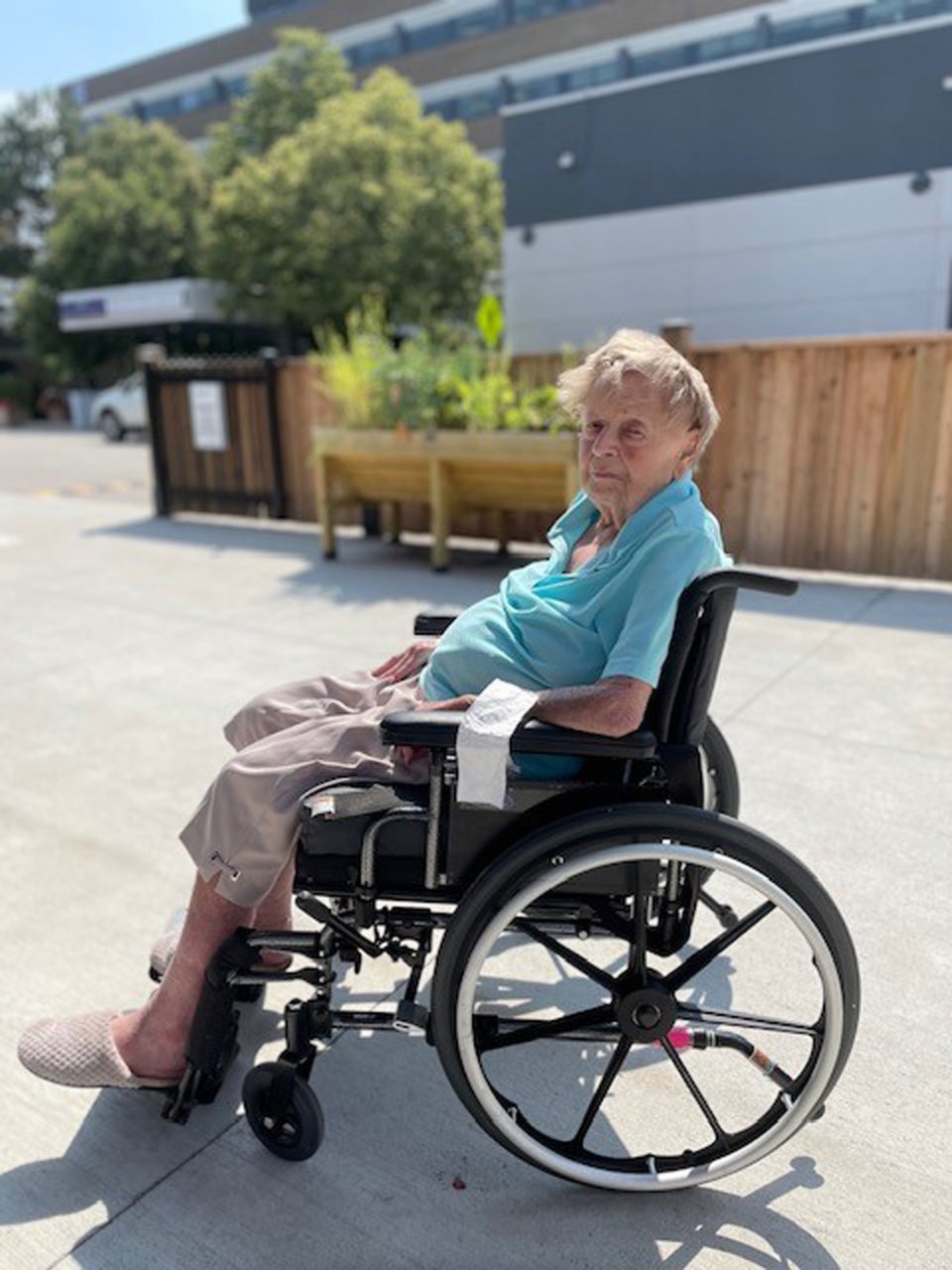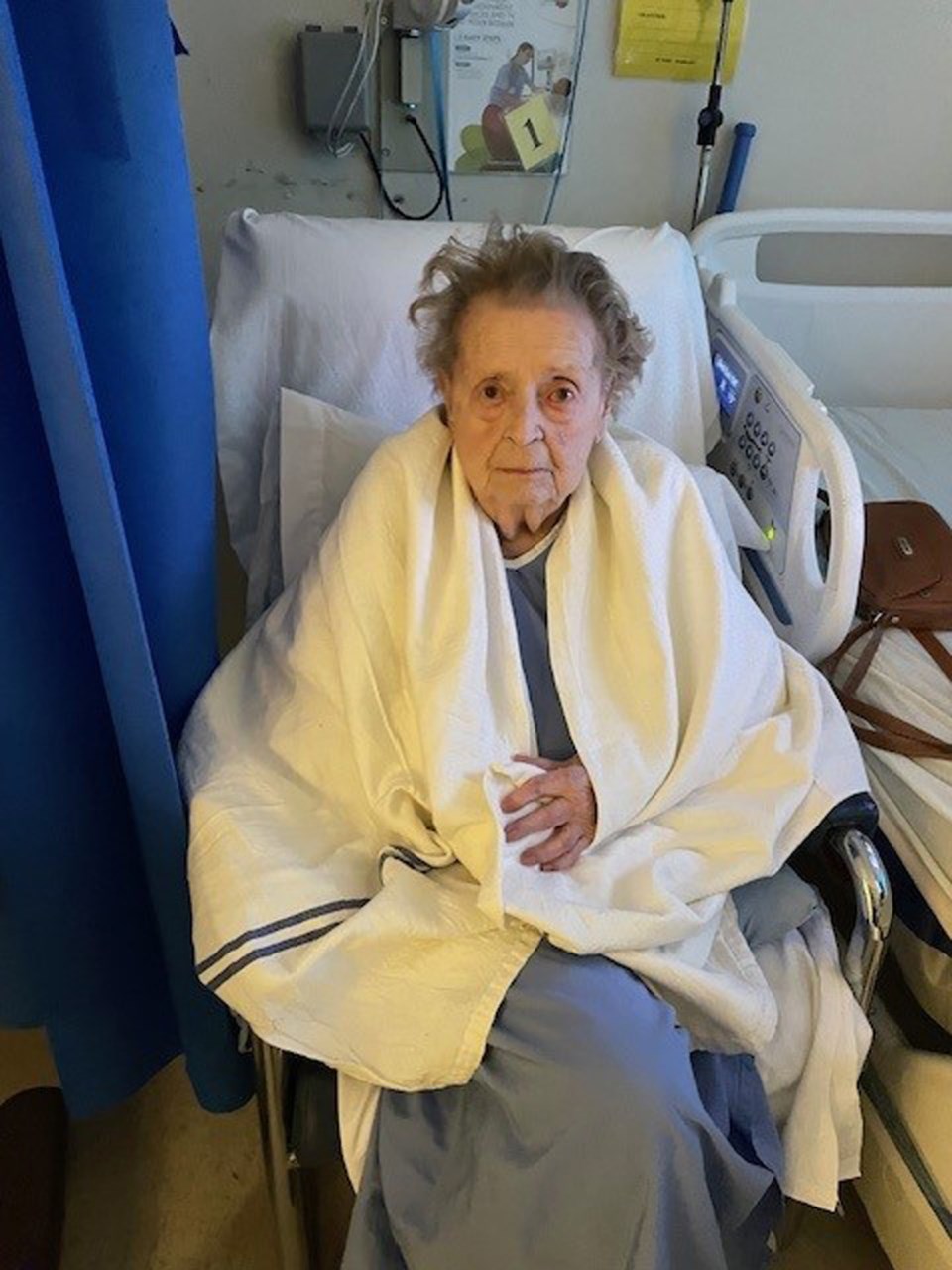At 93 years old, Margaret Marshall is effectively homeless.
Her daughter, Ruth Hall, recalled receiving a call on Jan. 17 from The Elden of Bradford saying Margaret was being transferred out of the retirement residence in which she had been staying, and would be sent to Southlake Regional Health Centre within an hour.
“Just like that,” Ruth recalled.
Living in nearby Holland Landing, Ruth said she visited her mother at The Elden several times a week, including the previous afternoon, at which time she claims staff requested to speak with her about concerns they had over her mother’s behaviour, which supposedly included some shouting and verbal abuse toward staff.
Following the conversation, Ruth said she tried to explain the situation to her mother, but after multiple attempts, Margaret still didn’t understand what she was doing wrong.
“I’m not sure if maybe dementia was setting in,” Ruth said, adding that was the first she was made aware of any issues.
She was quite surprised then to receive the call the next day, but said staff told Ruth not to worry, because Southlake had been informed of the transfer as part of an agreement between the two facilities.
Unsure of what to expect, Ruth went to Southlake to help her mother, only to find her sitting among “at least 100 people” in the emergency room (ER) with Margaret in nothing but a robe, slippers and a urine-soaked incontinence pad, as no one was available to help change her for about six hours.
“She just sat there shivering, crying her heart out. It was the most heartbreaking thing,” Ruth said, recalling that Southlake staff told her they had no idea why Margaret was there.
“It wasn’t Southlake’s fault. They didn’t even know when I first got there what she was doing there,” Ruth said.
While he couldn’t discuss the specifics of Margaret’s situation due to privacy concerns, Michael Peterson, president and chief executive officer of Levante Living (which operates 25 facilities across Ontario, including The Elden), said that once staff determine a resident’s needs can’t be met at The Elden, they call Southlake to request a transfer. He said the timing of the transfer is determined by staff at hospital, who send an ambulance to pick up the resident.
“The paramedics would handle the transfer and we would just secure the belongings of the resident and notify the family,” said Peterson, adding paramedics typically take the residents however they are dressed.
Margaret’s son, Steve Marshall, had been wintering at his home in Florida since October, and it “caught us by surprise” when he heard what was happening, because before leaving in the fall, he recalled his mother was “very happy,” at The Elden and “everything was good.”
“I thought this place was the Ritz Carlton of care homes, but all of a sudden it quickly ended and they said she was being abusive,” he said. “We had no idea this was coming.”
Understanding the temporary care unit
Steve explained that the province's Home and Community Care Support Services had placed Margaret in the temporary care unit (TCU) at The Elden in September 2023 while waiting for a permanent spot in a long-term-care (LTC) facility.
As part of a provincial initiative, The Elden began providing rooms for 26 LTC patients from Southlake in October 2020 in order to help free up hospital space, and currently has 50 rooms available with 35 occupied.
The expenses of TCU stays are covered by the provincial government at no cost to the residents or their families, and most residents stay in the TCU for about 1.5 months before finding more permanent accommodations, Peterson said.
Those residents come to The Elden because they no longer need hospital care, but can’t live on their own; however, Peterson said some residents’ medical conditions or behaviour can worsen in ways for which The Elden isn’t properly equipped to handle.
“We have a very qualified team of RPNs (registered practical nurses), PSWs (personal support workers) and other care staff, but there are certain health needs that some people have that we just don’t have the capacity to deal with ... those people are better served at the hospitals,” he said. “Under the TCU program, we are expressly required to return an individual to Southlake if their condition worsens beyond what our staff are licensed to care for in a retirement-home setting. We do our utmost to ensure that is done smoothly working with the hospital.”
How quickly the resident’s condition changes impacts when a transfer is requested and the notification provided to family members; Peterson explained that when it comes to behavioural issues, the situation can escalate "relatively quickly."
“We’re in the business of caring for seniors, so we want good care for them, but part of our responsibility is for the safety of our staff and other residents,” he said, noting even verbal abuse can justify requesting a transfer if it threatens safety.
Still, those instances are “very rare” and Peterson said records show that in all of 2023, fewer than five residents needed to be transferred back to hospital, out of what he estimated to be about 600 who used the TCU that year.
Margaret’s stay at The Elden followed a series of falls in the spring that left her unable to continue living independently in her condo, and led to her initially being placed in the Reactivation Care Centre near Highway 400 and Finch Avenue West.
Steve said he’s since filed a complaint with the agency and requested an investigation into The Elden’s treatment of his mother.
“The fact that they left my mother in a wheel chair with no real clothes, a robe and slippers is disgusting,” he said.
Not the only one waiting for care

Meanwhile, Ruth said her mother spent six days on a stretcher in the ER at Southlake before they were able to place her in a room for a few days, but she doesn’t blame the hospital.
“I have to say that Southlake has been wonderful to her,” she said. “They don’t have the staff, but they’re feeding her three meals a day, and they’re making sure she’s warm and secure. They have wonderful nurses.”
Since then, Ruth said the hospital has moved Margaret into a ward while she waits for placement in a care home.
Both Steve and Ruth explained their mother needs assisted living services like those found in LTC due to her health complications including trouble standing or walking on her own as a result of rheumatoid arthritis and knee replacements.
Ruth worries what would happen to her mother during the day while she’s at work, especially since “she can’t do stairs,” and Steve doubts she would be able to travel to and from Florida with him.
“She needs 24-hour care,” Ruth said.
Getting that care is proving difficult, though, and even though Ruth said they’ve registered Margaret at six different homes, she’s been told it could take as long as three years for a spot to become available.
“It’s like a bunch of cattle sitting there waiting for care homes when there’s nothing available,” she said.
At Southlake, patients who do not require acute care, but still needs assistance with day-to-day living, are considered to need alternate level of care (ALC), and while some of those ALC patients are sent to LTC homes or a retirement residence’s TCU, others have trouble finding availability in a facility that meets their needs.
As a result some ALC patients live at the hospital while they wait.
“Limited capacity in the community to receive ALC patients creates a situation where patients who need acute care may have to wait for an extended period of time in the emergency department or in unconventional spaces like a hallway, until a bed becomes available,” Lindsey Furlanic, communications strategist for Southlake said via email.
During the 2023-24 fiscal year, the hospital saw an average of 22 ALC inpatients waiting for placement in a long-term care facility, the same number waiting as of Jan. 31.
On average, those patients waited about 83 days before being placed into a facility, and in the meantime resided in acute care units across the hospital, including rooms with two beds or wards with as many as eight beds.
“Southlake is one of the most overcrowded hospitals in the province and is regularly over capacity as we struggle to transition and discharge patients to the most appropriate care setting,” Furlanic explained.
In the meantime, Ruth said the family will need to pay $65 per day or about $2,200 per month (after tax) for Margaret to remain in the ward, and in the meantime, Ruth added her mother still isn’t getting all the care that she needs, including regular bathing.
Family still in disbelief
Both siblings put the blame for their mother’s situation squarely on The Elden.
Ruth feels a retirement residence should have staff trained to properly help residents who may be experiencing dementia or other issues that come with aging.
“You just can’t ship the elderly out because they’re not up to your expectations. They’re 93, what are they going to do?” she said.
Peterson said many staff have completed programs “so there is a level of training and awareness,” regarding dementia, “but we do not have the proper setup or structure at The Elden to deal with dementia patients,” which would include a separated area with restricted access and more oversight.
“It’s a different level of care,” Peterson said.
As someone who spends several months of the year down south, Steve compared Margaret’s situation to the poor treatment he said he’s seen in the U.S. health-care system, calling it “disturbing.”
“The fact that they just dropped her off at the emergency room is just unacceptable. It really is,” he said. “We’re the greatest country in the world, and we don’t do that (stuff).”
Noting few people visit the residence, Peterson feels there’s “a misunderstanding of retirement homes versus long-term care,” and encouraged people to come and see The Elden for themselves.
“Our retirement homes are very hospitality based, and there’s 24-hour nursing care and support provided,” he said. “It’s a very positive experience for most of our residents.”



